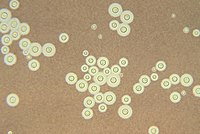
Photo from wikipedia
Introduction: Fluconazole is the most used antifungal drug for prevention and treatment of Cryptococcus spp. infections, the etiological agent of cryptococcosis. Resistance to fluconazole among Cryptococcus neoformans isolates can lead… Click to show full abstract
Introduction: Fluconazole is the most used antifungal drug for prevention and treatment of Cryptococcus spp. infections, the etiological agent of cryptococcosis. Resistance to fluconazole among Cryptococcus neoformans isolates can lead to treatment failure and generate relapses. Objective: To evaluate the expression profiles of the AFR1, MDR1 and ERG11 genes in C. neoformans var. grubii clinical isolates during the in vitro response to fluconazole induction. Materials and methods: Fourteen C. neoformans var. grubii isolates recovered from HIV patients were studied, in which 6 showed sensitivities to fluconazole and 8 decreased sensitivity. The expression levels of ERG11, AFR1 and MDR1 genes were determined by real-time PCR from extracted mRNA. Results: AFR1 and MDR1 genes from C. neoformans var. grubii were overexpressed in fluconazole resistant isolates, whereas ERG11 maintains homogeneous expression in all the evaluated resistance phenotypes of C. neoformans var. grubii isolates. Conclusions: The overexpression of AFR1 and MDR1 genes, which codify for efflux pumps, contributes to fluconazole resistance in the studied isolates. However, the resistance patterns in this fungus and the relapse cases in HIV patients cannot be attributed solely to the exposure to the drug. Heteroresistance and the emerging resistance (resistance through other ERG genes), might be other mechanisms involved in this phenomenon, which must be studied in these isolations.
Journal Title: Biomedica : revista del Instituto Nacional de Salud
Year Published: 2022
Link to full text (if available)
Share on Social Media: Sign Up to like & get
recommendations!